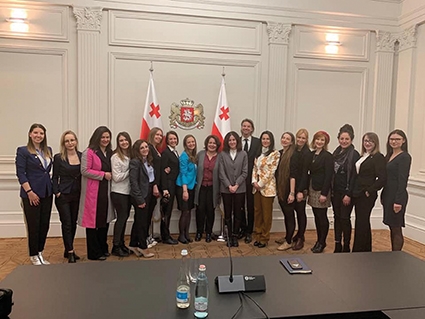The Future is Female
The Future is Female was the name of the European Leadership and Debate Academy’s (ELDA) five-day training that occurred in Tbilisi last week.
ELDA is an academy based in Berlin that addresses the issue of democracy in post-Soviet countries by engaging young leaders from South-Eastern Europe in an innovative learning experience. They offer skills and new attitudes that aim to empower a new generation of responsible and active citizens.
Their visit to Georgia was part of the ‘Female Leadership Academy 2019’ project, and they met over five days at Fabrika hostel, Tbilisi. The initiative gathers 15 female participants 18-35 years old from Ukraine, Georgia, Moldova, Armenia, Russia and Belarus to participate in three weeks of networking and training.
Being a successful woman in a predominantly male leadership culture can be challenging, but women can use their community-building strength to connect and help each other.
This ‘Female Leadership Academy 2019’ project creates space for women who believe they can make a difference. The goal is to train them to increase their leadership skills and share their knowledge with other women after the program ends.
GEORGIA TODAY met Christian Stahl, founder of EDLA, and three members of his team working passionately on this project.
“The idea of this academy came to me years ago,” Stahl tells us. “I was a journalist helping my NGOs friends with different projects, but I always ended up disappointed by the unsustainability of the projects. NGOs would come, then leave without implementing a long-term solution. I was deeply frustrated by this situation and realized I needed to create something different that lasted longer.
“Something clicked when I was at the last Maidan in Ukraine and saw that German journalists were only reporting Klitschko’s actions without really understanding what was happening. I decided I wanted to empower the voices of the local people and create a debate academy.”
Why did you decide to work in Eastern European countries in particular?
I want to empower youth from all European countries that may not belong to the European Union but encompass the European idea, and Ukraine is the perfect example of that as it has a long European history, just like Georgia.
We have to re-integrate the idea that those countries are European, and we need to empower a new generation of young female and male leaders who can drive the social change. We aim at a more democratic and pluralistic thinking by debate and leadership.
Our goal is not to tell Eastern European people how to be democratic, but rather to exchange, connect and work together. We go to the countries, learn, and realize projects with them. We are helping people with their own ideas, ideas that result in long-term projects, not short-term.
How do you plan to change things?
Mainly through a good use of media: to foster the idea that social change is easy, we just need to work together.
Nowadays, you can become famous on Instagram or with your own blog. The sad thing is that most people who become famous do not use these channels for social change or useful content.
We work together and try to spread the word. We really think we can make a different and drive social change by empowering the new generation.
How did you manage to get funding for the Academy?
I do political advising, so I knew people in the German government, however, it was incredible luck to get the funds from the Federal Foreign Office of Germany. Frank-Walter Steinmeier [the current German President, who was foreign minister at the time] agreed to support us.
What is the ‘Female Leadership Academy 2019’ project?
It is a three-part project that began in Lviv (Ukraine), is continuing in Tbilisi and will also happen in Odessa (Ukraine) in May. We gather the same participants in these three cities for about five days each for trainings and discussions. We get to know them and see the kind of projects they want to foster. These women are very strong female leaders. Most of them already have their own company even though they are so young. They are journalists, film directors, psychologists, etc.
What do you do specifically in Tbilisi?
We now have around six projects aimed at promoting gender equality, female leadership and breaking stereotypes.
One of the projects is about post-post Soviet feminism. This expression comes from women who do not identify themselves as post-Soviet women: they feel they are women of their own, part of a Union of Eastern European women. A Georgian photographer is doing portraits to break these stereotypes and plans to exhibit them soon. If we get some money, they will be able to extend this initiative.
We are also creating a small video to promote gender quotas in Georgia. We know it is an issue being debated but we need to get the quotas to reach gender equality. It was the idea of one of the participants, so we are supporting her. We’re creating an awareness-raising video and it is challenging to do that without excluding men. One of our current questions is: how can you address men on this topic without offending them?
One of our challenges is also that we always have a budget to conduct our trainings but no budget to shoot a film, for example.
The interview was edited for more clarity and was realized with the participation of Sergiy Pudich, Steffi Klein and Jessica Jorgas, who are all working on this project.
To find out more about ELDA and their projects: www.eldacademy.org/
By Gabrielle Colchen
Image Source: ELDA Facebook page












